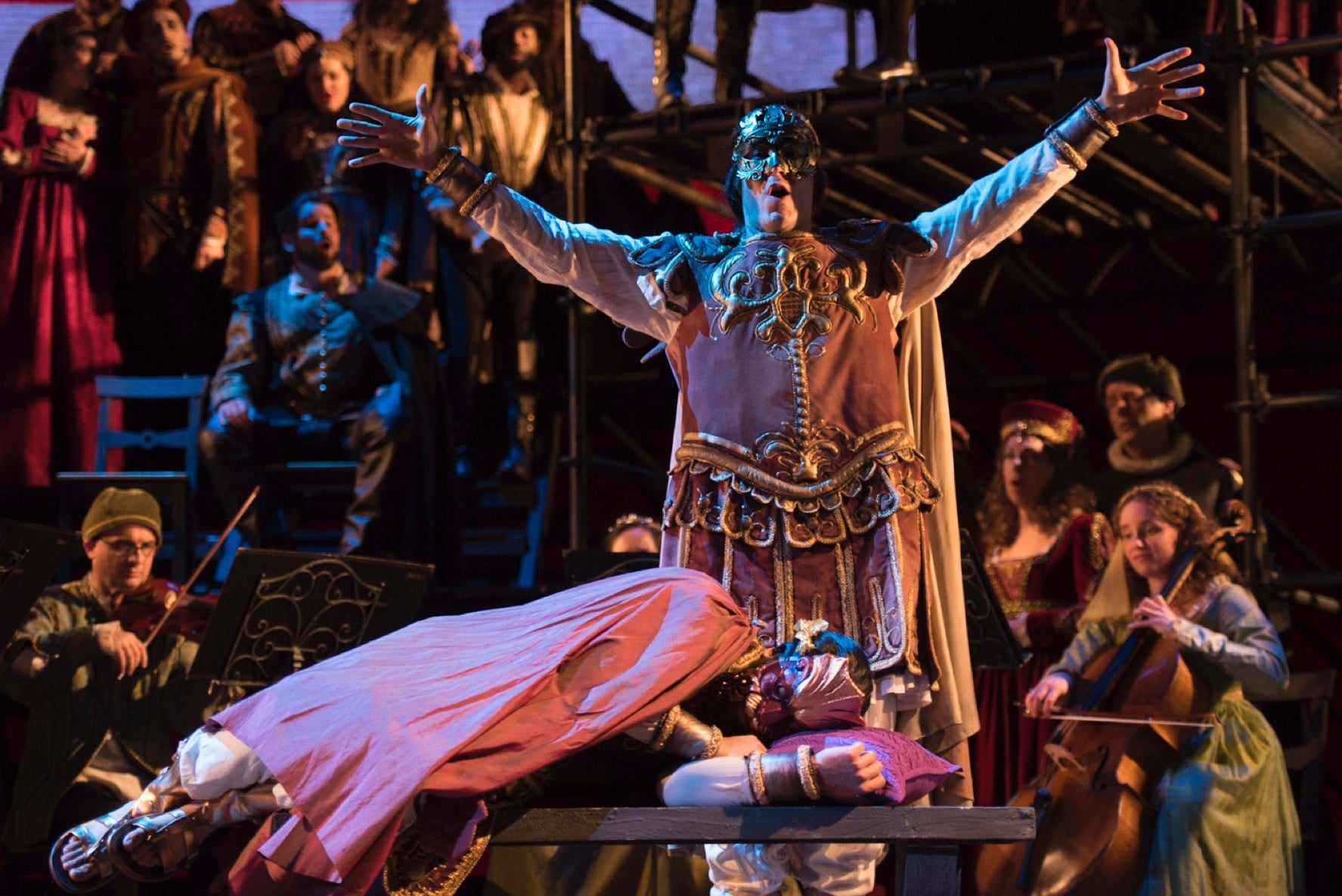‘Brilliant’ debut of two Shakespearean operas in Delaware

Hamlet rehearsal(photo courtesy of OperaDelaware)
OperaDelaware marks a triumphant return to full-stage productions with it’s spring festival.
Audiences who attended OperaDelaware’s inaugural spring festival over the weekend became part of history as they took in the East Coast premiere of Franco Faccio’s “Hamlet” and the Delaware professional premiere of Verdi’s “Falstaff.”
The event marked the company’s triumphant return to full-stage productions at Wilmington’s Grand Opera House following a three-year absence.
Programming two Shakespearean operas is not only a tribute to the 400th anniversary of the Bard’s legacy. It also explores the complex—and sometimes contentious—relationship between two composers, a librettist and their desire to raise Italian opera to a higher art form.
Verdi’s last two operas “Otello” (1887) and “Falstaff” (1893) with librettos penned by Arrigo Boito were the closest he came to writing the kind of through-composed opera Wagner pioneered.
But these operas were not Boito’s first foray into Shakespeare. Prior to those twin peaks of achievement, he wrote the libretto for “Hamlet” (“Amleto’) for an opera composed by promising fellow student Franco Faccio. The work enjoyed moderate success when premiered in Genoa in 1865. But an 1871 revision failed miserably when an ailing tenor was forced to perform because there was no understudy. Crushed, Faccio channeled his talents into conducting and the opera was never again performed during his lifetime.
Both Boito and Faccio were fervent revolutionaries anxious to bring Wagner and his principles of the music drama to Italy. Boito’s public praise of Faccio as the future of Italian opera offended Verdi, the representative of the old order. Fortunately for opera, the rift would heal.
Faccio’s esteemed view of Wagner is evident in the prominent orchestral writing and the direct, often declamatory vocal style, a marked contrast to the bel canto tradition. Still, the opera has its lyrical moments, as in the choral finale for the play-within-a-play and Ophelia’s mad scene, all the more poignant without the coloratura.
Credit must go to conductor Anthony Barrese who reconstructed Faccio’s score and led the orchestra in a brilliant performance.
Period costuming honored the play’s legacy while Peter Tuptza’s contemporary set design forced the audience to reassess Shakespeare as modern and nimble rather than cumbersome and hidebound.
Additional visuals were provided by projections and live feeds which punctuated the drama at key points. Especially effective was the projection of The Ghost (Ben Wager) admonishing an increasingly mad Hamlet to stay the course and avenge his murder.
Baritone Timothy Mix delivered a prideful Claudio while mezzo-soprano Lara Tillotson and soprano Sarah Asmar excelled as Gertrude and Ofelia respectively. Tenor Joshua Kohl was as valiant and sensitive a Hamlet as anyone could hope for.
Almost twenty years later, a seasoned Boito tempted the perennially retiring Verdi with two projects based on Shakespeare.
Unlike “Amleto” which hews closely to the text of the play, “Falstaff” is based on “The Merry Wives of Windsor” along with scenes from “Henry IV.” But like “Amleto,” “Falstaff” lay neglected after its premiere in 1893 until revived a few years later by Arturo Toscanini. (Opera buffs may have been disappointed by the lack of traditional arias and choruses.)
In a twist of fate, Faccio, who had become music director at La Scala in Milan and who had presided over the premiere of “Othello,” would more than likely have done the same for “Falstaff” were it not for his premature death in 1891.
The story revolves around a portly knight who hatches a plot to seduce society matrons so he can get his hands on their husbands’ money. The merry wives come up with a plan of their own to humiliate the would-be suitor.
There’s not a serious bone in this opera’s body and the cast of this production plays it for the farce that it is. Bass-baritone Steven Condy is the undisputed star of the show, mixing slapstick with virtuosic arias about the joys of alcohol, the uselessness of honor and the aphrodisiac powers of his own bulging belly.
The rest of the cast is equally superb with standout performances by sopranos Victoria Cannizzo as Alice and Sharin Apostolou as her daughter Nannetta, who gets to sing the prettiest arias and some flirtatious duets with tenor Ryan MacPherson as her intended Fenton. Ann McMahon Quintero applies her rich mezzo-soprano (as well as a “wiggle in a walk”) as a deliciously bawdy Mistress Quickly.
The festival continues through this weekend as the cast continues to bring these fresh and rediscovered operas to life.
Remaining performances:Amleto: Friday, May 20 at 7:30 p.m.; Sunday, May 22 at 2 p.m.Falstaff: Saturday May 21 at 7:30 p.m.Ticket prices: $29 – $95For more information visit www.operade.org or call 302-442-7807
WHYY is your source for fact-based, in-depth journalism and information. As a nonprofit organization, we rely on financial support from readers like you. Please give today.

